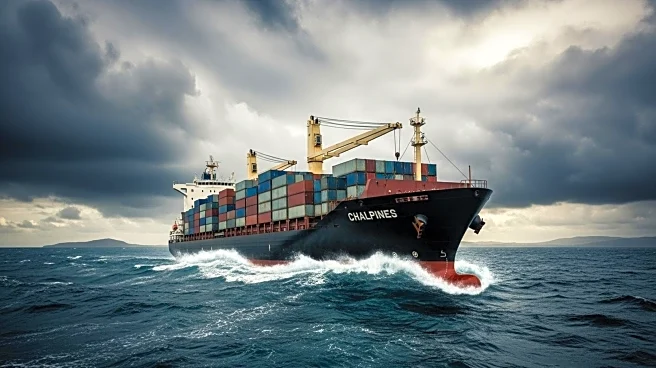What is the story about?
What's Happening?
The United Nations Conference on Trade and Development (UNCTAD) has released a report indicating that global maritime trade is entering a period of fragile growth, rising costs, and increased uncertainty. The report highlights that global seaborne trade volumes grew by 2.2% in 2024 but are expected to slow to just 0.5% in 2025. Factors such as vessel rerouting have driven ton-miles to a record 6% in 2024, significantly outpacing trade volume growth. UNCTAD warns that geopolitical tensions, new trade barriers, and climate pressures are reshaping shipping routes, increasing costs, and exposing vulnerabilities in the global economy. The report emphasizes the impact on small island developing states, least developed countries, and net food importing nations, which face higher freight costs leading to more expensive imports and food insecurity.
Why It's Important?
The report from UNCTAD underscores the challenges facing the global shipping industry, which is crucial for international trade and economic stability. Rising costs and fragile growth in maritime trade can have significant implications for global supply chains, particularly affecting smaller and less developed countries that rely heavily on imports. The increase in freight costs can exacerbate food insecurity and economic instability in these regions. Additionally, the report highlights the need for investment in digital systems and infrastructure to improve efficiency and sustainability in shipping. The industry's greenhouse gas emissions rose by 5% in 2024, with only a small portion of the fleet equipped to use alternative fuels, indicating a pressing need for regulatory signals to spur fleet renewals and new fuel infrastructure.
What's Next?
UNCTAD calls for stable trade policies to reduce uncertainties and restore confidence in supply chains. Support for vulnerable economies will be essential to mitigate the higher costs associated with the transition to environmentally sustainable shipping practices. Investment in shipping and port infrastructure, as well as digitalization and cybersecurity, is necessary to address the challenges outlined in the report. UNCTAD warns of 'stormy seas' ahead as trade slows and costs rise, emphasizing the need for resilience, inclusivity, and sustainability in maritime transport to navigate these turbulent waters.
Beyond the Headlines
The report highlights the ethical and environmental dimensions of the shipping industry's challenges. The need for sustainable practices and reduced emissions is critical in addressing climate change and its impact on global trade. The transition to net-zero strategies requires clear regulatory signals and investment in new technologies, which can drive long-term shifts in the industry. The focus on digitalization and cybersecurity also points to the growing importance of technological advancements in enhancing efficiency and resilience in global shipping.
















